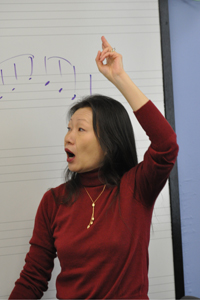
Phil Farnsworth
Rosey Lee
Position
Professor
Affiliated Departments
Telephone
617-747-2847
For media inquiries, please contact Media Relations
Career Highlights
- Sonata in Three Movements and 24 Solar Terms released by Centaur Records
- Guest composer at the third annual Double Reed Festival at the University of Memphis
- Fulfilled a commission for "Prayer for the Universe" for mixed chorus and piano for the Arlington-Belmont Chamber Chorus
- Composed two celebration suites, which were premiered by the Boston Wind Ensemble in 1994 and 1998, and have been performed at graduation ceremonies each year since
- Received two Uchida Fellowships from the Japan Foundation
Education
-
School NameBoston UniversityState or ProvinceMassachusettsDegreeDoctor of Musical Arts (D.M.A.)Field of StudyCompositionDate Degree Received
-
School NameBerklee College of MusicState or ProvinceMassachusettsDegreeBachelor of Arts (B.A.)Field of StudyCompositionDate Degree Received
In Their Own Words
